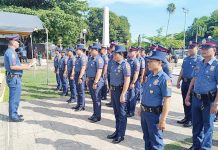
By EUGENE ADIONG
BACOLOD City — If we are to talk about martial law, particularly the ordeal that activists had to go through that time, veteran Negros journalist Edgar Cadagat certainly has one compelling story to tell.
Cadagat, who used to be a columnist for Panay News, still has vivid memories of that fateful day when President Ferdinand Marcos declared martial law on September 21, 1972.
“I already anticipated that I will be arrested,” he told this writer yesterday.
At the time, Cadagat was a public school teacher at the Educational Training Center and School in this capital city of Negros Occidental.
He was also the chairperson of the progressive youth group Kabataang Makabayan in the province, actively organizing chapters and recruiting members.
“I did not report for work that day and just stayed at home with my nephews,” he said.
Cadagat said it was 8 o’clock in the evening when Philippine Constabulary (PC, now Philippine National Police) officers led by Capt. Isidro Derit knocked on their door.
“They told my father that they came to our house to invite me to the (provincial) PC headquarters for questioning,” he said.
He said the PC officers took him and brought him to the house of Ely delos Santos, another Kabataang Makabayan member who later became a journalist, where they “forced me to ask the delos Santos family where (Ely) was at the time.”
“When we confirmed that Ely was not around, they brought me to the residence of Judy Taguiwalo, a [leftist youth organization] Samahang Demokratiko ng Kabataan leader, but she was not there, too,” said Cadagat.
On their way to the PC headquarters onboard a jeep, Derit ordered Cadagat to jump off the moving vehicle.
Derit “pushed me several times, forcing me to jump, but I refused,” Cadagat, who now writes for a local daily here, recalled.
When he arrived at the PC headquarters, PC provincial commander Col. Mariano Filart interrogated him “as if I was a criminal and fugitive,” the former Negros Press Club president said.
“I saw other activists being detained,” Cadagat said. He also remembered a PC officer shouting at him, pointing him, berating him, “You are a public school teacher but a nincompoop!”
He said the stockade where he and his fellow activists were detained could accommodate only eight people, but “we were more than 15 inside!”
“We were required to run early in the morning. We were manhandled without hesitation,” the veteran journalist recalled.
Cadagat said that after nearly a year of detention at the provincial PC headquarters, some of them — including him — were transferred to a Philippine Army camp in Lapu-Lapu, Cebu after the military received information that the New People’s Army will rescue them.
Like his fellow activists, Cadagat said he was tortured, but not as much as the others. What may have saved him from severe manhandling, he said, was “the fact that my father was a public school principal and an older brother was an officer of the Philippine Navy.”
Still, he said, his detention and the “psychological and physical torture” he went through caused him to suffer “serious anxiety, sleepless nights and all [sorts of] injuries.”
After nearly two years in detention, Cadagat was freed and returned to Bacolod City.
“The city then was quiet,” he reminisced. “Nobody dared speak against the Marcos dictatorship.”
Cadagat worked at the city hall under then Mayor Carlos Benares until the time of Mayor Raymundo Dizon, brother of Josefa Dizon, wife of the incumbent Mayor Monico Puentevella.
Later, he worked as a full-time journalist, writing about social issues for various national and international news organizations.
Cadagat was one of the claimants in the class suit and direct action plaintiffs in the Human Rights Litigation against Marcos before the United States Federal District Court of Honolulu in Hawaii.
He has already received his financial compensation, but he said no amount of cash could compensate for his suffering in the hands of the PC during the Marcos regime. “We want justice. [We want] the perpetrators punished,” he stressed./PN



